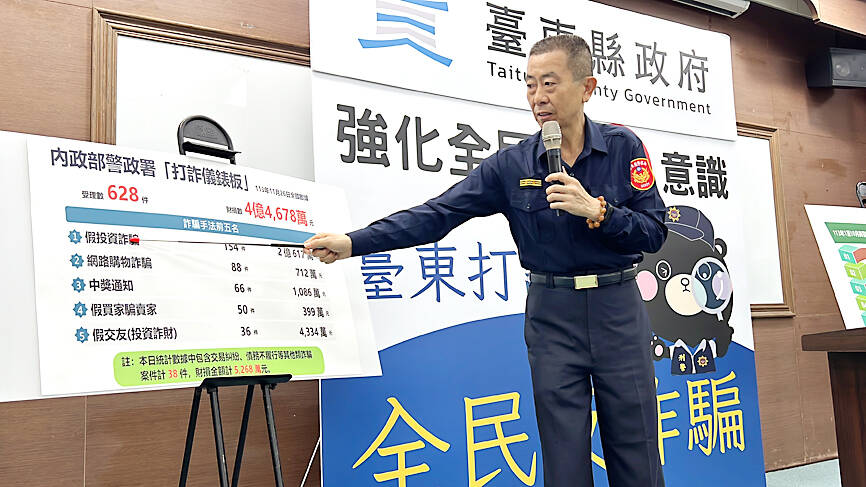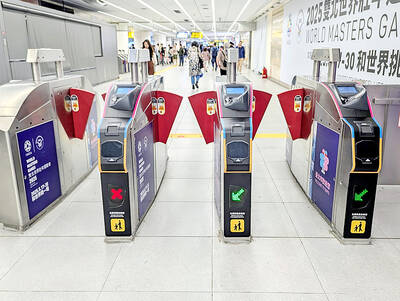New guidelines to combat scams would facilitate coordination across ministries, with the goal of stopping up to NT$10 billion (US$307.49 million) in scams and about 60,000 fraudulent ads from being posted annually, the Executive Yuan said yesterday.
The new guidelines follow amendments to the Fraud Crime Hazard Prevention Act (詐欺犯罪危害防制條例), Code of Criminal Procedure (刑事訴訟法), Communication Security and Surveillance Act (通訊保障及監察法), and Money Laundering Control Act (洗錢防制法)by the legislature in July.
The guidelines hope to increase the public’s ability to spot and prevent scams, and increase penalties for scamming, it said.

Photo: CNA
The Ministry of the Interior said it aims to promote awareness of the rule of law among people of different age groups through 500 events and 140 million text messages, targeting an audience of 50 million annually to prevent scams.
Meanwhile, the Ministry of Digital Affairs said it would implement a real-name system for advertisements on the Internet by next month, and has talked with Google, Line and Meta about such systems.
Google and Line said they would implement the system, and Meta “pledged” to introduce it, the digital ministry said.
Efforts to prevent malicious software from taking users to scam-related sites hope to block 30,000 domains, it said, adding that it is working with Apple to set limits on online transactions.
The digital ministry said it is also working to establish a third-party virtual bank payment inquiry system to mitigate scam losses.
The National Communications Commission (NCC) issued a report saying that it is considering establishing a database to verify user identity and restrict high-risk users from applying for telecommunication services.
The NCC said it has a list of 2.21 million SIM cards purchased overseas, but it has only gone through 100,000 numbers, so it vowed to step up efforts next month to look through the remaining 2.1 million.
The Financial Supervisory Commission said it is pushing measures to ask credit card issuers to increase their monitoring of credit card transactions to prevent fraud.
Its credit card fraud prevention reporting platform hopes to share information with banks and institutions that issue credit cards to mitigate risk, it added.
The Ministry of Justice said it is increasing the rate of confiscating illegal proceeds by 3 percent per year and is working closely with international partners to reduce overseas crime and crack down on cross-border scams.

A magnitude 6.4 earthquake struck off the coast of Hualien County in eastern Taiwan at 7pm yesterday, the Central Weather Administration (CWA) said. The epicenter of the temblor was at sea, about 69.9km south of Hualien County Hall, at a depth of 30.9km, it said. There were no immediate reports of damage resulting from the quake. The earthquake’s intensity, which gauges the actual effect of a temblor, was highest in Taitung County’s Changbin Township (長濱), where it measured 5 on Taiwan’s seven-tier intensity scale. The quake also measured an intensity of 4 in Hualien, Nantou, Chiayi, Yunlin, Changhua and Miaoli counties, as well as

Credit departments of farmers’ and fishers’ associations blocked a total of more than NT$180 million (US$6.01 million) from being lost to scams last year, National Police Agency (NPA) data showed. The Agricultural Finance Agency (AFA) said last week that staff of farmers’ and fishers’ associations’ credit departments are required to implement fraud prevention measures when they serve clients at the counter. They would ask clients about personal financial management activities whenever they suspect there might be a fraud situation, and would immediately report the incident to local authorities, which would send police officers to the site to help, it said. NPA data showed

ENERGY RESILIENCE: Although Alaska is open for investments, Taiwan is sourcing its gas from the Middle East, and the sea routes carry risks, Ho Cheng-hui said US government officials’ high-profile reception of a Taiwanese representative at the Alaska Sustainable Energy Conference indicated the emergence of an Indo-Pacific energy resilience alliance, an academic said. Presidential Office Secretary-General Pan Men-an (潘孟安) attended the conference in Alaska on Thursday last week at the invitation of the US government. Pan visited oil and gas facilities with senior US officials, including US Secretary of the Interior Doug Burgum, US Secretary of Energy Chris Wright, Alaska Governor Mike Dunleavy and US Senator Daniel Sullivan. Pan attending the conference on behalf of President William Lai (賴清德) shows a significant elevation in diplomatic representation,

The Taipei MRT is to begin accepting mobile payment services in the fall, Taipei Rapid Transit Corp said on Saturday. When the company finishes the installation of new payment units at ticketing gates in October, MRT passengers can use credit cards, Apple Pay, Google Pay and Samsung Pay, the operator said. In addition, the MRT would also provide QR payment codes — which would be compatible with Line Pay, Jkopay, iPass Money, PXPay Plus, EasyWallet, iCash Pay, Taiwan Pay and Taishin Pay — to access the railway system. Currently, passengers can access the Taipei MRT by buying a single-journey token or using EasyCard,